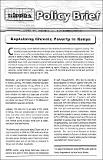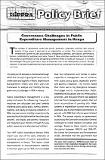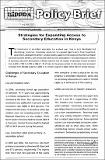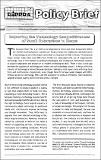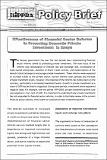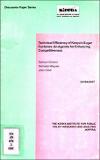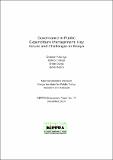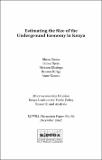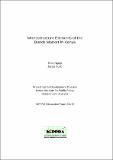Search
Now showing items 1-10 of 13
Policy Brief No. 09 of 2007 on Explaining Chronic Poverty in Kenya
(The Kenya Institute for Public Policy Research and Analysis, 2007)
Chronic poverty can be defined in terms of the duration households are trapped in poverty. The
chronically poor are those who are always poor, or usually living below the poverty line. The
chronic poor suffer persistent ...
Policy Brief No. 04 of 2007 on Governance Challenges in Public Expenditure Management in Kenya
(The Kenya Institute for Public Policy Research and Analysis, 2007)
The concept of governance covers the social, economic, corporate, political and cultural
aspects of how power is exercised in an organization or society. The common principles in
the exercise of power include: accountability, ...
Policy Brief No. 03 of 2007 on Strategies for Expanding Access to Secondary Education in Kenya
(The Kenya Institute for Public Policy Research and Analysis, 2007)
Policy Brief No. 10 of 2007 on Improving the Technology Competitiveness of Small Enterprises in Kenya
(The Kenya Institute for Public Policy Research and Analysis, 2007)
The Sessional Paper No. 2 of 2005 on Development of Micro and Small Enterprises (MSEs)
for Wealth and Employment Creation for Poverty Reduction singles out restricted levels
of technology as one of the major constraints ...
Policy Brief No. 11 of 2007 on Effectiveness of Financial Sector Reforms in Promoting Domestic Private Investment in Kenya
(The Kenya Institute for Public Policy Research and Analysis, 2007)
The Kenyan government has over the last decade been implementing financial
sector reforms aimed at promoting private investment. The main focus of the
reforms was liberalization of interest rate and exchange rate, ...
Discussion Paper No. 84 of 2007 on Technical Efficiency of Kenya's Sugar Factories: An Agenda for Enhancing Competitiveness
(The Kenya Institute for Public Policy Research and Analysis, 2007)
This paper provides estimates of technical efficiency in Kenya sugar
factories. It examines factors that affect technical efficiency by applying
a stochastic production frontier approach over the period 1996-2005
using ...
Discussion Paper No. 77 of 2007 on Governance in Public Expenditure Management: Key Issues and Challenges in Kenya
(The Kenya Institute for Public Policy Research and Analysis (KIPPRA), 2007)
This paper develops a conceptual framework for applying good governance to systems of public expenditure management (PEM), and analyses governance in public expenditure management in Kenya. An overview of some key governance ...
Discussion Paper No. 82 of 2007 on Estimating the Size of the Underground Economy in Kenya
(The Kenya Institute for Public Policy Research and Analysis (KIPPRA), 2007)
The underground economy comprises economic activities not accounted for in national income statistics and is, therefore, difficult to measure. The difficulty arises because this economy comprises a host of traditional and ...
Discussion Paper No. 75 of 2007 on Free Secondary Education in Kenya: Costs, Financing Sources and Implications
(The Kenya Institute for Public Policy Research and Analysis, 2007)
The study analyses the feasibility of Free Secondary Education (FSE) in
Kenya. Its purpose is to present an analysis on whether Kenya can afford
FSE and how such a programme can be financed without compromising
the gains ...
Discussion Paper No. 73 of 2007 on Microstructure Elements of the Bonds Market in Kenya
(The Kenya Institute for Public Policy Research and Analysis (KIPPRA), 2007)
The importance of market microstructure in determining the success of a bonds market in allocating financial resources depends on the degree to which the microstructure elements have been designed to determine the proper ...

